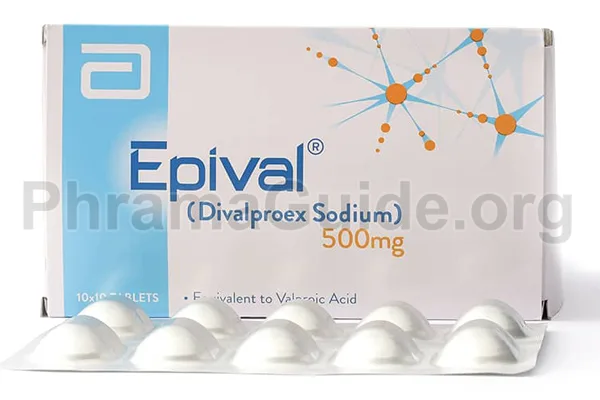Epival is a medication used to treat various conditions, including epilepsy, bipolar disorder, and migraine headaches. Like most medications, Epival can have side effects, some of which are more common and others that are less common.
Common Side Effects
- Nausea and Vomiting: Gastrointestinal symptoms like nausea and vomiting are relatively common, especially when starting the medication. Taking the medication with food or dividing the daily dose can help reduce these symptoms.
- Drowsiness: Some individuals may experience drowsiness or tiredness while taking Epival.
- Weight Gain: Weight gain is a known side effect, which can be of concern for some people, especially when taking the medication long-term.
- Tremors or Shaking: Some individuals may experience mild hand tremors or shakiness.
- Hair Loss: Thinning of hair or hair loss can occur, though it is generally reversible upon discontinuation of the medication.
- Increased Appetite: Some people may experience an increased appetite, contributing to potential weight gain.
Less Common Side Effects
- Liver Function Abnormalities: Epival can affect liver function. In rare cases, it may lead to serious liver problems, which may cause symptoms like jaundice (yellowing of the skin or eyes), dark urine, or abdominal pain. Regular liver function tests are usually recommended.
- Pancreatitis: Pancreatitis (inflammation of the pancreas) is a less common but potentially serious side effect. Symptoms may include severe abdominal pain, nausea, and vomiting.
- Blood Disorders: Epival can affect blood cell counts, leading to a reduction in platelets or white blood cells. This can increase the risk of bleeding or infections.
- Allergic Reactions: While rare, some individuals may experience severe allergic reactions, with symptoms such as rash, itching, swelling, severe dizziness, and difficulty breathing.
- Increased Ammonia Levels: In rare cases, Epival can lead to elevated levels of ammonia in the blood, which may cause symptoms like confusion and lethargy.
- Mood Changes: Some individuals may experience mood changes, such as increased irritability or depressive symptoms.
- Cognitive Changes: Cognitive effects like memory problems or confusion may occur in some people.

What is Epival?
Epival is one of the leading brands of Divalproex sodium, manufactured and marketed by Abbott Pharma Pakistan.
Epival : Available Formulations and Strengths
Presently, Epival is available in Tablet, Injection, and Syrup Forms
Epival Tablets : 250mg and 500mg Strengths
Epival Syrup : 250mg/5ml
Epival Injection : 500mg/5ml
What Are The Possible Drug Interactions of Epival?
- Other Antiepileptic Drugs: Interactions can occur when Epival is taken alongside other antiepileptic drugs, including phenytoin, carbamazepine, and phenobarbital. These drugs can affect each other’s levels in the bloodstream, requiring careful monitoring and possible dosage adjustments.
- Warfarin: Epival can increase the levels of the blood thinner warfarin, potentially leading to an increased risk of bleeding. Frequent monitoring of your International Normalized Ratio (INR) is necessary if you are taking both drugs.
- Lamotrigine: Concurrent use of lamotrigine and Epival may increase the risk of a serious skin rash, such as Stevens-Johnson syndrome. Your healthcare provider may need to adjust the dosages or closely monitor you.
- Topiramate: Topiramate is another antiepileptic drug that can interact with Epival. Combining these two medications can increase the risk of side effects, such as dizziness or tiredness.
- Medications Metabolized by CYP2C9: Epival can affect the metabolism of drugs metabolized by the CYP2C9 enzyme, such as phenytoin, warfarin, and nonsteroidal anti-inflammatory drugs (NSAIDs). This can lead to changes in the levels of these drugs in the blood.
- Medications Metabolized by CYP3A4: Epival can also interact with drugs metabolized by the CYP3A4 enzyme, like some statins (e.g., simvastatin), leading to increased levels of these drugs in the bloodstream.
- Aspirin and Other Salicylates: Epival can displace aspirin and other salicylates from their binding sites, leading to increased levels in the blood and potential toxicity.
- CNS Depressants: Combining Epival with other central nervous system (CNS) depressants, such as alcohol or sedative medications, can enhance sedation, drowsiness, and cognitive impairment.
- Antidepressants: Some antidepressants, particularly selective serotonin reuptake inhibitors (SSRIs) like fluoxetine, may interact with Epival, increasing the risk of bleeding or mood-related side effects.
- Clozapine: When Epival is taken with clozapine (an antipsychotic medication), it may increase the risk of agranulocytosis, a severe reduction in white blood cell counts.

Leave A Comment